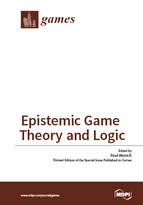Epistemic Game Theory and Modal Logic
A special issue of Games (ISSN 2073-4336).
Deadline for manuscript submissions: closed (31 July 2010) | Viewed by 47385
Special Issue Editor
Special Issue Information
Dear Colleagues,
The contemporary culture of game theorists and experimentalists was formed in the period 1980-1995, and is virtually free of understanding of the role of the modal logic of knowledge and belief in evaluating models of rational behavior and their equilibrium properties. There is, of course, a specialized literature, including Nobel prize recipient Robert Aumann and his students, but this is ill-understood and indeed widely ignored outside this circle of experts. As a result, most economists simply do no know what the implications of rationality really are.
I want papers in this special issue to show the relevance of epistemic game theory for the working economist and experimentalist. I tried to go some distance towards this goal in my recent book, The Bounds of Reason (Princeton, 2009), but there is much work to be done and much misinformation to be corrected.
Prof. Dr. Herbert Gintis
Guest Editor
Keywords
- epistemic game theory
- epistemic logic
- modal logic






